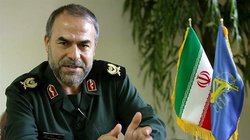 A senior commander of Iran’s Islamic Revolution Guards Corps (IRGC) has described a United States plan for forming a naval coalition to interfere in the Persian Gulf as a self-defeating initiative.
A senior commander of Iran’s Islamic Revolution Guards Corps (IRGC) has described a United States plan for forming a naval coalition to interfere in the Persian Gulf as a self-defeating initiative. RNA - “The enemy should know that it cannot do anything. As have its previous coalitions, this one, too, will definitely go to rack and ruin and fail to materialize,” the IRGC deputy commander for political affairs, Brigadier General Yadollah Javani, said in Tehran on Thursday, Tasnim News Agency reported.
“The region’s security is provided by its nations, Iran, and our Armed Forces,” he asserted.
Amid its attempts to trouble Iran’s foreign oil sales as part of its sanctions targeting the Islamic Republic, the US has announced plans to form a Washington-led maritime force to supposedly secure the Strait of Hormuz in the Persian Gulf, which hosts considerable international oil shipments.
On Tuesday, the US officially asked Germany to participate — alongside Britain and France — in the coalition, a request that was declined by German Foreign Minister Heiko Maas a day later.
Maas said Wednesday that there was no military solution to the ongoing standoff in the region and Berlin would rather pursue a policy that prevents further escalation of tensions.
"Germany will not take part in the sea mission presented and planned by the United States," Maas told reporters on a trip to Warsaw, the Polish capital.
By its own admission, the United States has spent astronomical sums on its wars in this region, without either succeeding or performing in a way that could result in a successful outcome.
Back in February 2017, US President Donald Trump famously said during a White House address that the country had spent $6 trillion on Washington’s so-called war on terror.
Trump said since the US first invaded Afghanistan, and 17 years later, the region is still a "hornet's nest." He added that "we never win" and "we don't fight to win."
In 2014, Washington led scores of its allies in a so-called coalition purporting to fight Daesh in Iraq and Syria. The coalition, however, never uprooted the Takfiri terror group, which was defeated by the two Arab countries and some of their allies, including Iran, three years later.
Elsewhere in his remarks, Javani addressed the US threats of military attack on Iran, saying, “Were the Americans intent on engaging in a battle with us, they would have probably shown some reaction after the downing of the Americans’ most modern and advanced drone” by Iranian forces.
In June, the IRGC Air Force brought down the US-made Global Hawk surveillance drone near the Kouh-e Mobarak region — which sits in the central district of Jask County — after the aircraft violated the Iranian airspace.
Javani emphasized that if the US aircraft had been downed using an advanced S-300 or S-400 air defense system, its downing could not have been rated as a source of pride.
“But this masterpiece of American technology, which is reputed for being radar-evasive and stealth in action, was hunted down by an indigenous [Iranian] defense system dubbed Khordad-3,” he said.
The IRGC commander reiterated that Washington essentially does not harbor the idea of attacking Iran, apparently pointing to several occasions when senior American officials have disowned such intention.
“If, however, they choose to perpetrate a blunder someday, the entire region will come crashing on their heads,” the IRGC deputy commander aconcluded.
847/940